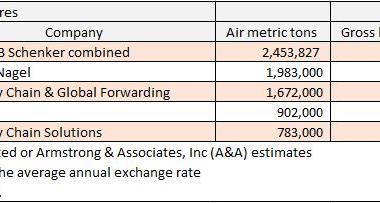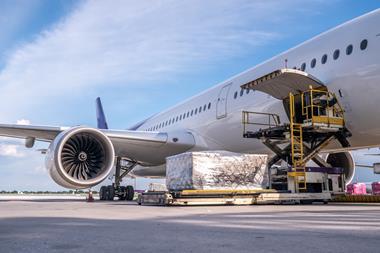Credit ratings agency S&P has re-affirmed the forwarder's current credit rating of A- but revised its outlook to negative due to the risks associated with its planned €14.3bn take over of German logistics giant DB Schenker.
S&P said that its decision to revise the firm's outlook from stable to negative reflects the possibility it could lower the A- rating if DSV faces unexpected operational adversities, its free operating cash flow trends consistently below its base case, and it fails to reduce debt and restore credit measures to the rating commensurate level within 18 months after the deal closes.
"We could lower the rating if we expect the weighted average adjusted funds from operations (FFO) to debt to decrease and remain below 45% due to weaker financial performance compared with our forecast, which could stem from, for example, integration challenges or fading industry fundamentals that lead to stalling organic growth and deteriorating profitability," S&P said.
"Additional unexpected leveraging transactions that would indicate a deviation from management's financial policy and commitment to rapidly reduce debt could also trigger a downgrade."
Overall, while there is a risk with such a large take over, S&P highlighted the benefits of the deal in the medium term.
It said that while the group's use of acquisition debt financing will likely drag the adjusted FFO to debt below 45% by the close of the transaction, the metric will gradually improve assuming there are no issues with the integration or other business disruptions.
"The acquisition, which will enlarge DSV's size and scale, is margin-dilutive for the combined group at the close of the deal," S&P said. "Yet we believe DSV will likely restore the margins of the combined group to its existing industry-leading average level over the medium term. This is due to DSV's strong profitability track record."
DSV's EBIT margin currently stands at an "industry-leading average" level of about 10% compared with an average of about 6%-7% at Schenker level.
The ratings agency said that DSV's established track record of successfully integrating logistics companies and similarities with Schenker's business model might enable a relatively smooth integration process but added that there were risks.
"This is DSV's largest acquisition to date and thus it might entail a higher execution risk than DSV's smaller historical deals," S&P said.
"Based on the starting leverage falling short of our rating guidelines, there is limited financial leeway under the current 'A-' rating for unforeseen integration challenges or other operational setbacks that would alter our expected deleveraging trend.
"We currently view the transaction as business profile neutral for DSV; however, we would review our assessment as we gain more certainty on how the group manages the integration and if it is able to lift profitability."
Moody's responds to the deal
Meanwhile, Moody's has also posted its initial reaction to deal. It said it sees "strong benefits" to DSV's business profile by adding Schenker's "extensive European coverage" to its offering, especially in road transport where it holds the largest market share.
"The greatest potential, however, lies in DSV's ability to structurally lift Schenker's profitability towards its own industry-leading level, particularly in Air & Sea freight forwarding," Moody's said.
The agency noted positively DSV's ambition to improve the operating margin of the combined entity to its current levels within the third year after the transaction closes.
"However, this is a challenging task considering DSV's EBIT margin is almost twice as large as Schenker's – 10.6% vs. 5.5% respectively for the last twelve months ending June 30, 2024," Moody's said.
In terms of integration, Moody's said that the acquisition will be the largest and likely the most complex in DSV's history, although it also pointed out that the company has a "strong track record of increasing productivity and efficiency in acquired companies by extracting both cost savings and revenue synergies".
"This was evident with Panalpina in 2019 (revenue of €5.5bn) and Agility in 2021 (revenue of €3.6bn). We however acknowledge that Schenker is considerably larger with revenue of €18.4bn (on a twelve month basis as of June 30, 2024)."
"We see material risks in terms of execution and realisation of expected synergies, particularly due to the social commitments made to Schenker's German employees, which will be in effect for two years after closing.
"The operational risks should also be considered in relation to the substantial debt load that DSV will incur to finance the acquisition, estimated to be around €6bn to €7bn depending on the amount of equity raised."
Moody's also welcomed DSV's decision to equity finance €4bn to €5bn of the purchase consideration; terminate its current DKK1.5bn (€200m) share buyback programme and reiterate its commitment to maintaining its credit ratings.















